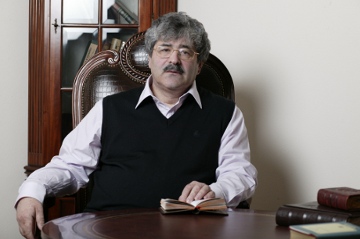
ON MAY 17, Henry Kissinger's latest book On China reached the American bookshops. This is a book about China but the panoramic thinking of the "last of the Mohicans" of international politics extended beyond China, a starting point for the man whose vast experience and an absolute relevance of whose ideas about what is going on in the world leaves one duly impressed.
Those who talk to him invariably say that his skill to draw on historical lessons when talking about current developments dwarfs many of the modernist models and theories: he laments that "contemporary politicians have very little sense of history. For them the Vietnam war is unimaginably far behind us, the Korean war has no relevance anymore, even though that conflict is very far from over and at any minute has the capability of going from cold to hot."
In an interview which can be described as a preview of his latest book he answered the question of what he thought about President Obama's gradual withdrawal from Afghanistan with what he had told President Nixon about American pullout from Vietnam: "I wrote a memorandum to Nixon which said that in the beginning of the withdrawal it will be like salted peanuts; the more you eat, the more you want... once you start a drawdown, the road from there is inexorable. I never found an answer when Le Due Tho was taunting me in the negotiations that if you could not handle Vietnam with half-a-million people, what makes you think you can end it with progressively fewer?... We will find the same challenge in Afghanistan."
Kissinger believes that the presence or absence of al Qaeda will be the least of its problems. What might happen, he says, is a de facto partition, with India and Russia reconstituting the Northern Alliance, and Pakistan hooked to the Taliban as a backstop against their own encirclement.
He has described a possible scenario for the next world war unrelated, in a direct way, to China. He is convinced that today "China is an indispensable element in any stabilization of perilous situations in Korea. Without China's active participation, any attempts to immunize Afghanistan against terrorism would be futile." The jihadism threatens China as well as the Central Asian countries and also Russia. This brings Russia and China closer together.
He says about Stalin: "Stalin's last years were haunted by the same conundrum, never 'solving the problem of how their influence in China would continue'." He failed and soon the United States and China draw closer in the face of the "Soviet threat."
What did Kissinger know about China when playing the "China card"? Absolutely nothing, he admits. From the very beginning the talks between the two countries were strictly confidential which meant that briefings from official agencies or the best of the brain centers were excluded.
Kissinger had to seek advice from the most prominent Sinologists well-versed in the country's latest history. Some of them came up with wise suggestions yet none of them said: "Now you really ought to understand how they think." At that point Kissinger revealed another of his outstanding abilities: a crash course of self-education followed. Kissinger studied China's culture and history; tried to grasp the language and the categories of Chinese civilization until the quantity of knowledge developed into a quality of political decisions. He overcame all bureaucratic barriers to come up with a suggestion that China should be recognized as a single and undivided state. The variant which was miraculously hailed by Beijing and Taiwan offered both a chance to pose, some time in future, as the principal unifier of the Celestial Empire.
Kissinger easily finds his bearings in history to explain the current collisions and developments; he does not indulge in abstract futurology. Predictology is his genre; some of his predictions are rather foreboding. He talks of Pakistan as a "Sarajevo" of the next world war: "Think proxy half-states; the paranoia of encirclement; the bristling arsenals, in this case nuclear; the nervous, beleaguered Pakistanis lashing out in passive-aggressive insecurity. An India-Pakistan war becomes more probable. Eventually." He goes on to say: "Therefore some kind of international process in which these issues are discussed might generate enough restraints so that Pakistan does not feel itself encircled by India and doesn't see a strategic reserve in the Taliban... I know if we let matters driftthis could become the Balkans of the next world war."
Recently I heard from a colleague of mine a somewhat unexpected assessment of the situation in Pakistan and of what Pakistanis think of Russia. It turned out that the Pakistani elite is quite well-versed in Russian and Soviet culture; for many of them The Moabit Notebooks by Soviet Tatar poet Musa Calil was one of the most important books. This is not merely diplomacy. The Pakistanis say that neither weapon deliveries, nor financial aid brought them closer to the Americans; the bridge of trust is fairly shaky: political surprises like the recent liquidation of bin Laden send it tottering. In other words, several scores of people should be forced to study so that, very much like Kissinger, to finally realize that Pakistan is not a far away country and that instead of seeking a niche so far occupied they should bring peace to where there is war.
read more in our Telegram-channel https://t.me/The_International_Affairs

 15:00 01.08.2011 •
15:00 01.08.2011 •






















